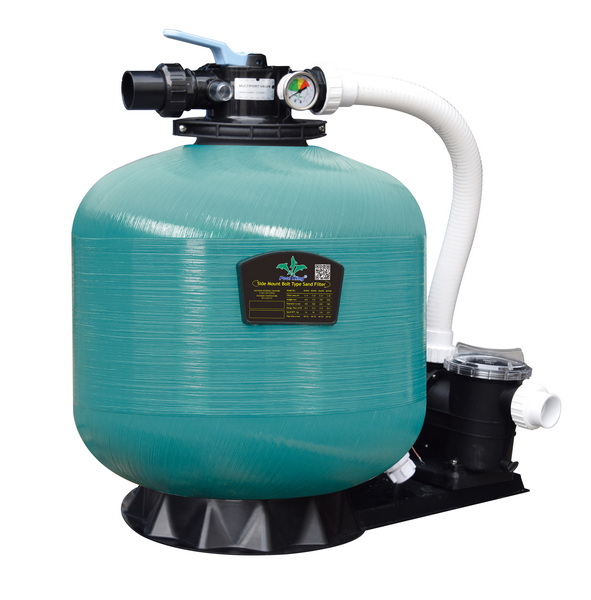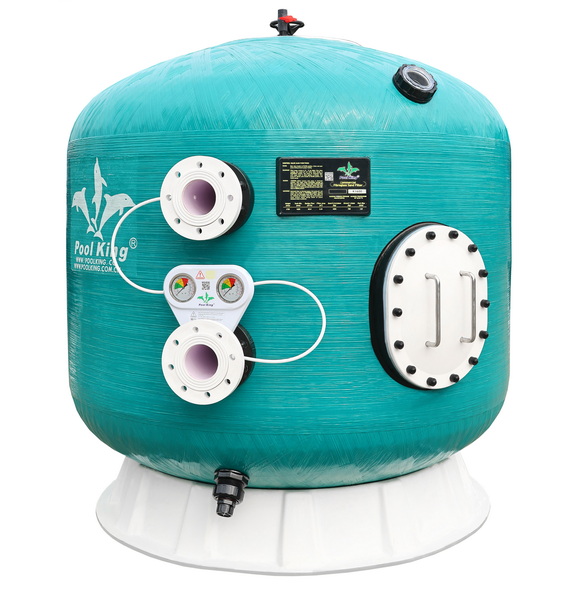Views: 222 Author: Tina Publish Time: 2025-09-02 Origin: Site








Content Menu
● Why Backwash a DE Pool Filter?
● How Often Should You Backwash a DE Pool Filter?
● How Long to Backwash a DE Pool Filter?
● Step-by-Step Guide to Backwashing a DE Pool Filter
● Best Practices for Backwashing DE Filters
● Deep Cleaning and Maintenance of DE Filters
● Safety and Handling of DE Powder
● Troubleshooting Common DE Pool Filter Issues
>> 1. How often should I backwash my DE pool filter?
>> 2. How long should I backwash my DE filter each time?
>> 3. Can I backwash too frequently?
>> 4. How do I recharge the filter with DE powder?
>> 5. What if my filter pressure stays high after backwashing?
Diatomaceous Earth (DE) pool filters are highly regarded for their superior filtration capabilities, efficiently removing microscopic particles and contaminants to keep pool water crystal clear. However, their performance depends heavily on regular maintenance, especially backwashing. This article explores in detail how long you should backwash a DE pool filter for optimal performance, when and why backwashing is necessary, and how to maintain the system to extend its life. Detailed instructions, best practices, troubleshooting, and frequently asked questions are included to help pool owners manage their DE filters confidently. Multimedia resources such as instructional videos and images supplement this guide for enhanced clarity.

A DE pool filter uses diatomaceous earth, a powder made from fossilized remains of microscopic sea organisms, as a filtration medium. This powder coats a set of grids inside the filter tank, trapping particles as small as 5 microns. Thanks to this fine filtration ability, DE filters are considered among the most effective pool filters available. Unlike sand or cartridge filters, DE filters require both periodic backwashing to flush out debris and recharging with fresh powder to maintain their filtering power.
Backwashing is the process of reversing water flow inside the filter to dislodge dirt, oils, and debris that accumulate on the DE-coated grids. This cleaning restores water flow efficiency, reduces pressure buildup, prevents strain on the pump, and prolongs the lifespan of the filter system. Ignoring backwashing leads to clogged grids that impair filtration effectiveness and can cause costly damage.
- Typically, backwash your DE filter every 4 to 6 weeks during the busy swimming season.
- In the off-season or cooler months, backwashing can be spaced to every 6 to 8 weeks.
- Always backwash if the pressure gauge reads 8-10 psi higher than the clean, normal operating pressure.
- Additional backwashing is recommended after heavy pool usage or environmental changes like storms that bring large debris loads.
- Most sources recommend backwashing for about 2 to 3 minutes per cycle or until the water in the waste line or sight glass runs clear.
- For thorough cleaning, repeat the backwash and rinse cycle 2 to 3 times. This ensures all built-up DE powder and debris are removed.
- Larger pool filters might require 3 to 5 minutes per backwash cycle due to their size and volume.
- Always monitor the water clarity during backwashing to judge when to stop.

1. Turn off the pool pump to prevent water flow while changing valve positions.
2. Rotate the multiport valve to “Backwash” or slide valve handle to the backwash position according to your filter type.
3. Turn the pump on and run backwash for 2-3 minutes, watching the waste water for clarity.
4. Turn off the pump, then rotate the valve handle to “Rinse”.
5. Run the pump for 30 seconds to rinse and resettle the DE powder.
6. Repeat backwash and rinse cycles 2-3 times if necessary.
7. Turn off the pump, rotate valve to “Filter”.
8. Turn pump on and add fresh DE powder slowly through the skimmer to recharge the filter.
Typically, 4-6 pounds of DE powder are needed after each backwash to ensure full coverage of the grids.
- Always turn off the pump before moving the multiport valves to protect the seals and prevent damage.
- Use the pressure gauge as the main indicator; backwash when pressure is 8-10 psi higher than the baseline operating psi.
- Avoid excessive backwashing, which wastes water and DE powder unnecessarily. Short “bump” backwashes can extend intervals between full cycles.
- Clean filter grids manually at least twice per year by removing them and rinsing or soaking in DE cleaner to remove oils and buildup.
- Regularly check and replace worn parts like gaskets or valves for smooth operation.
Besides regular backwashing, thorough grid cleaning is crucial to maximize filter efficiency. Every 6 to 12 months, remove the grid assembly and:
- Rinse the grids thoroughly with a hose to remove residual DE powder and debris.
- Soak the grids in a DE filter cleaning solution or mild acid solution to dissolve oils and scale buildup.
- Rinse again well after soaking and dry before reinstalling.
- Carefully reinstall grids and add fresh DE powder to restore filtration capability.
Annual deep cleaning removes contaminants that backwashing alone cannot clear. It prevents reduced flow and clouded water issues related to clogged or damaged grids.
- Always wear a dust mask and gloves when handling DE powder to avoid respiratory or skin irritation.
- Use only pool-grade DE powder approved for swimming pool use to ensure safety and effectiveness.
- Avoid spilling DE near the pool as loose powder can cloud the water or cause health concerns.
- Dispose of spent DE according to local waste regulations to minimize environmental impact.
- High filter pressure after backwashing: May indicate the need for manual grid cleaning or inspection for torn grids.
- Cloudy water despite backwashing: Check for insufficient DE powder recharging or damaged grids.
- Difficulty moving valve handle: Inspect and replace worn valve gaskets or handles to avoid leaks or incomplete backwashing.
- Low water flow or suction: Could be a pump issue, clogged skimmer baskets, or partially clogged grids needing deeper cleaning.
Routine inspections and timely repairs keep the filter running smoothly and water clear.
Properly backwashing a DE pool filter involves running the backwash cycle for about 2 to 3 minutes or until the waste water runs clear, usually repeated 2 to 3 times with rinsing steps in between. Maintaining a schedule of backwashing every 4 to 6 weeks during the swim season, based on pressure gauge readings and pool conditions, maximizes filter efficiency and longevity. Additionally, periodic deep cleaning of filter grids and proper DE powder replenishment ensure pristine pool water quality season after season. Following these best practices allows pool owners to enjoy the superior filtration power of DE filters with reduced downtime and maintenance headaches.

Typical recommendation is every 4 to 6 weeks, or whenever the pressure rises 8-10 psi above the baseline operating pressure.
Run the backwash cycle for 2-3 minutes or until water in the waste line runs clear; repeat 2-3 times if necessary.
While not harmful, over-backwashing wastes water and DE powder; it's best to rely on pressure readings as a guide.
After backwashing and rinsing, add 4-6 pounds of fresh pool-grade DE powder slowly through the skimmer with the pump running.
The grids may need manual cleaning or inspection for damage; deep clean the grids or replace if necessary.
[1](https://www.thefibreglasspoolcompany.com.au/a-guide-to-diatomaceous-earth-de-filters/)
[2](https://royalpoolsandmore.com/how-to-maintain-a-diatomaceous-earth-d-e-pool-filter/)
[3](https://www.swimmingpool.com/maintenance/pump&filter/how-to-backwash-de-pool-filter/)
[4](https://envirowaste.com.au/mastering-pool-filter-maintenance/)
[5](https://www.poolmaintenancesingapore.sg/de-filter/)
[6](https://alliedpools.com/maintaining-your-de-filter-system)
[7](https://watercraft.com.sg/how-to-clean-and-maintain-pool-filters-effectively-in-singapore/)
[8](https://poolie.com/blog/cleaning/de-pool-filter/)
[9](https://poolpartstogo.com/blogs/articles/how-to-clean-and-refill-a-pool-d-e-filter-the-right-way)
[10](https://www.youtube.com/watch?v=G5le8TN9Vwo)
[11](https://www.youtube.com/watch?v=2lQX2xtG7FE)
[12](https://www.youtube.com/watch?v=bCu4f5sVU-k)
